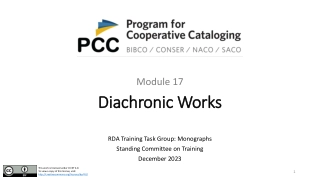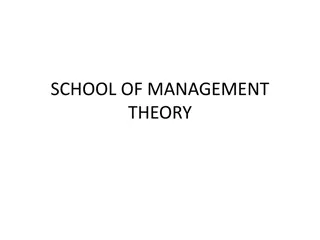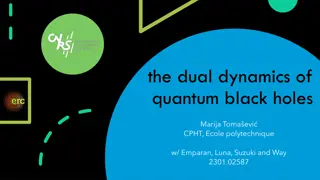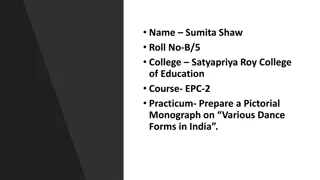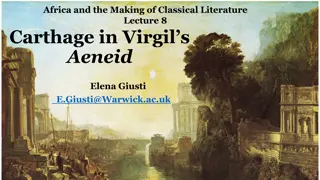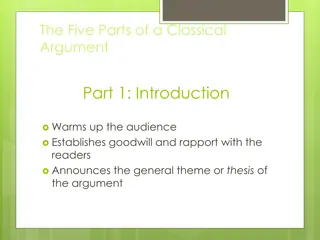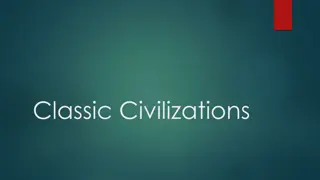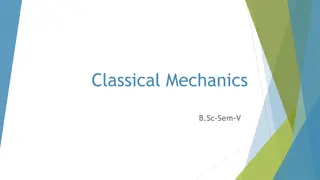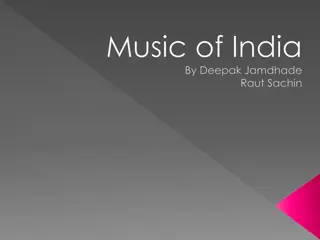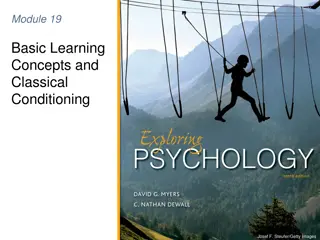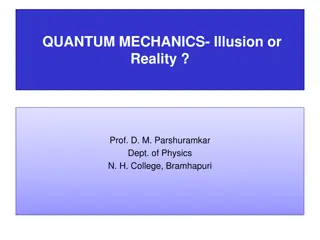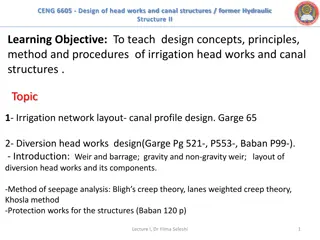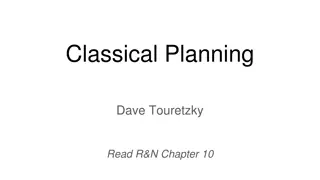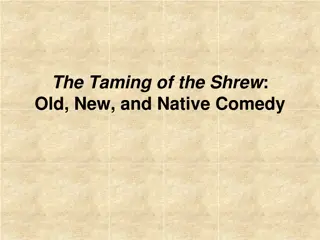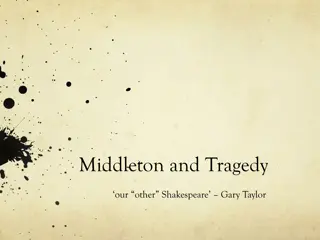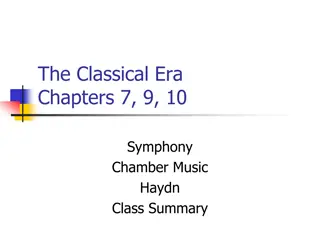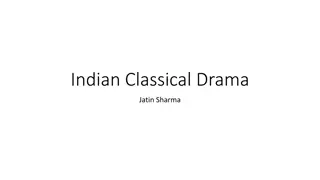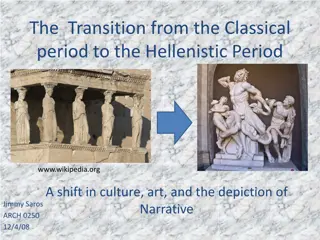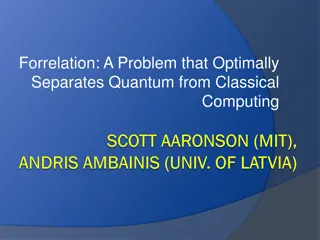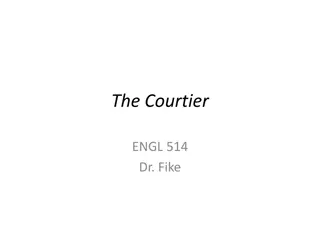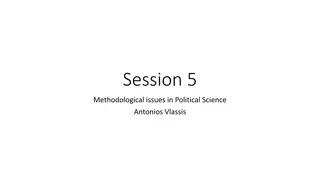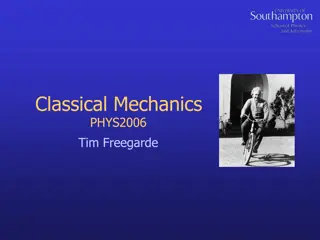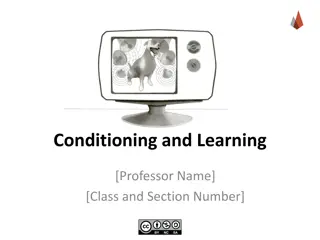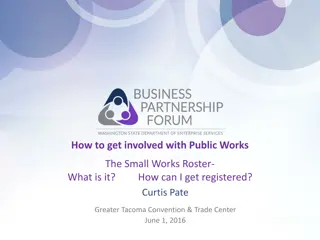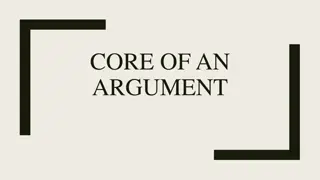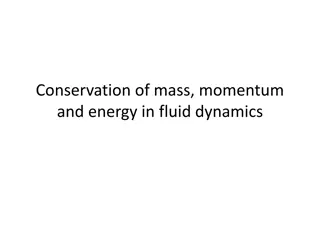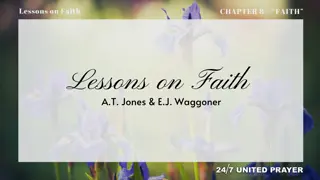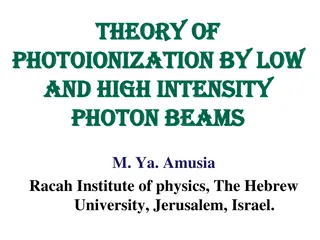Coins of Early and Classical Athens
Explore the evolution of Athenian coinage from early to classical times, reflecting civic values and community identity through silver currency. Discover the rich history and significance of these ancient coins.
1 views • 29 slides
Diachronic Works
The concept of diachronic works, learn to distinguish them from static works, understand extension plans, and recognize the significance of WEM lock in determining new works in this RDA training module.
1 views • 67 slides
Understanding Works Contract Services Under GST Act 2017
Works contract services under the CGST Act, 2017 involve various activities related to immovable property with the transfer of goods, treated as a supply of services. The levy of tax on different types of works contracts is explained, highlighting the applicable rates for different scenarios such as
0 views • 17 slides
Evolution of Management Theories: Classical Approach and Scientific Management
Explore the evolution of management theories focusing on the Classical Approach and Scientific Management. The Classical Approach emphasizes efficiency and specialization, while Scientific Management introduced systematic methods to increase productivity. Learn about key figures like Frederick Winsl
6 views • 31 slides
Exploring Quantum Black Holes: Dual Dynamics and Brane Evaporation
Exploring the dual dynamics of quantum black holes reveals new perspectives on black hole evaporation. By placing black holes on branes, we can study their classical picture in higher dimensions. This approach provides insights that were previously unattainable, leading to a better understanding of
1 views • 28 slides
Exploring the Rich Dance Forms of India
India's diverse cultural landscape is reflected through its various dance forms. From the spiritual Classical dances to the celebratory Folk dances, each form carries a unique essence and history. Bharatnatyam, Kathak, Kuchipudi, and more showcase the vibrant traditions and stories of different regi
0 views • 15 slides
Carthage: A Heterotopic Space in Classical Literature
Carthage, as depicted in Virgil's Aeneid and through artworks by Claude le Lorrain and J.M.W. Turner, is examined as a heterotopic space in classical literature. The concept of imagined geographies and heterotopias is explored in relation to Carthage, highlighting how it was represented, contested,
0 views • 31 slides
Understanding Fiscal Policy Options in Economics
Explore the evolution of economic theories including classical economics, demand-side economics, and supply-side economics. Learn about the impact of key figures like John Maynard Keynes and Milton Friedman on fiscal policy decisions and the U.S. economy. Delve into the strategies employed during th
0 views • 18 slides
Understanding the Five Parts of a Classical Argument
The classical argument is composed of five main parts: Introduction, Narration, Confirmation, Refutation and Concession, and Summation. Each part plays a crucial role in presenting a well-structured and persuasive argument, with devices and strategies such as diction, syntax, and figurative language
0 views • 6 slides
Understanding Classical Civilizations: Timeline Analysis and Periodization
Explore the concept of periodization by creating a timeline of significant life events and categorizing them into distinct periods. Learn about classical civilizations, time periods, and the process of dividing history into eras. Dive into the Classical Age and its contributions to human development
1 views • 24 slides
Understanding Classical Mechanics: Variational Principle and Applications
Classical Mechanics explores the Variational Principle in the calculus of variations, offering a method to determine maximum values of quantities dependent on functions. This principle, rooted in the wave function, aids in finding parameter values such as expectation values independently of the coor
0 views • 16 slides
Diverse Music Traditions of India - Classical to Folk
Explore the rich musical heritage of India, encompassing classical Carnatic and Hindustani music, folk melodies, film songs, and pop music. Learn about the intricate nuances of Indian classical music, its historical evolution, and the variety of genres within the music landscape of the country.
0 views • 8 slides
Examples of Classical and Operant Conditioning
Robert receiving a ticket for driving under the influence illustrates operant conditioning with negative punishments, while Chris being afraid of dogs after being bitten showcases classical conditioning with stimulus generalization. Jacob's joy from smelling his date's cologne demonstrates classical
1 views • 9 slides
Understanding Basic Learning Concepts and Classical Conditioning
Acquiring new information and behaviors through experience is known as learning. One common way we learn is through associative learning, where we connect certain events together. This process can take the form of classical conditioning, where stimuli evoke automatic responses, or operant conditioni
1 views • 14 slides
Exploring Quantum Mechanics: Illusion or Reality?
Delve into the fascinating realm of quantum mechanics with Prof. D. M. Parshuramkar as he discusses the contrast between classical and quantum mechanics. Discover how classical mechanics fails to predict the behavior of electrons in atoms and molecules, leading to the development of quantum mechanic
1 views • 70 slides
Design of Head Works and Canal Structures - Learning Objectives and Evaluation
This course covers the design concepts, principles, methods, and procedures related to the design of irrigation head works and canal structures. Topics include irrigation network layout, diversion head works design, seepage analysis methods, protection works, canal profile design, canal head regulat
0 views • 4 slides
Understanding Classical Planning in Artificial Intelligence
Classical planning in AI involves problem-solving with defined states, actions, preconditions, and effects. This text explores the concept of planning, classical planning characteristics, and provides examples such as the rocket problem with optimal and suboptimal plans.
0 views • 38 slides
Influences on Shakespeare's Comedy Explained
Exploring the influences on Shakespeare's comedy, this content discusses the classical and native traditions that shaped his works. From classical Greek and Roman comedic styles to English traditions of misrule and identity switching, this piece uncovers the elements that were incorporated into Shak
0 views • 22 slides
Tragedy in Renaissance England: A Comparative Analysis of Shakespearean Influences
Tragedy in Renaissance England was influenced by classical Greek and Roman models as well as late medieval works like those by Seneca and John Lydgate. Shakespeare and his contemporaries drew inspiration from these sources, creating intense explorations of suffering, evil, and the fall of exceptiona
3 views • 16 slides
Understanding Classical Era Symphony and Chamber Music
In the Classical Era, symphonies emerged as standalone works separate from operas, featuring a typical format of four movements with varying moods and tempos. Chamber music, enjoyed by players and listeners alike, particularly the string quartet, was popular. Haydn, with patronage from the Esterhazy
5 views • 7 slides
Insights into Indian Classical Drama and Literature
Explore the rich tradition of Indian classical drama and literature, from its origins in Ujjain during the Gupta period to the classification of major and minor dramas. Learn about the components of a classical Sanskrit drama, such as the plot, characters, sentiments, acting, and more. Delve into th
1 views • 9 slides
Classical Conversations Plus Program Overview
Explore Classical Conversations Plus program partnership opportunities, including the SEU partnership for homeschool students in grades 11-12. Learn about the administrative team, benefits, courses, and the Classical Christian education background rooted in the Western tradition. Discover how parent
0 views • 11 slides
Transition from Classical to Hellenistic Period: Art and Narratives
The evolution from the Classical period to the Hellenistic period in Ancient Greece brought significant shifts in culture, art, and storytelling. Classical art focused on idealized human forms and naturalistic poses, while Hellenistic art embraced more dramatic expressions and emotions. The narrativ
0 views • 23 slides
Understanding Vacuum Fluctuations in Quantum and Classical Physics
Explore the intriguing concept of vacuum fluctuations in both classical and quantum physics, delving into their experimental effects and significance. From classical interpretations of empty space to quantum field theory's zero-point fluctuations, discover how vacuum properties influence particle in
0 views • 38 slides
Quantum vs. Classical Computing: Exploring Forrelation Problem
Delve into the world of quantum and classical computing with the Forrelation problem that optimally separates the two realms. From Fourier correlations to quantum algorithms and classical lower bounds, explore the intricacies of distinguishing between quantum and classical computation through variou
0 views • 29 slides
Analysis of Themes in "The Courtier" and Connections to Classical Works
Explore the themes of courtly grace, love, beauty, and human nature in "The Courtier" through connections to classical works such as Plato's "Ladder of Love" and Shakespeare's "Hamlet." Delve into the concept of sprezzatura and the progression towards virtue as seen in Bembo's writings. Consider the
0 views • 25 slides
Understanding Costing and Pricing of Road Works
Exploring the process of costing and pricing road works, including factors to consider, building up rates, and the importance of accurate cost estimation. Contractors cost road works to estimate resources, set competitive prices, and ensure profitability. Various approaches to costing works and key
0 views • 24 slides
Understanding the Relationship Between Faith and Works in James 2:14-26
Exploring the key concepts of faith and works as discussed in James 2:14-26, this content delves into the importance of genuine faith evidenced by one's actions. It addresses the contrast between faith with works (living and genuine) and faith without works (dead), emphasizing the inseparable connec
0 views • 15 slides
The Logical Structure of Classical and Quantum Mechanics
The paper explores the common logical structure shared between classical and quantum mechanics, emphasizing the non-distributive lattice embedded in a distributive one. It discusses how all physical theories must adhere to this structure, incorporating topology, Heyting algebra, Boolean algebra, and
1 views • 36 slides
Insights on Faith and Works in the Epistle to Jewish Christians by Martin Luther
Lessons from Martin Luther's epistle to Jewish Christians emphasize the importance of faith and works, highlighting that trials develop our faith, God is the source of all good gifts, and faith without works is dead. The interaction between faith, obedience, and works is explored through the example
0 views • 7 slides
Basics of Learning: Classical and Operant Conditioning Overview
Types of learning include classical conditioning, operant conditioning, and observational learning. Classical conditioning involves pairing a neutral stimulus with a meaningful one to elicit a response. Operant conditioning focuses on how consequences influence behavior. Terminology like UCS, UCR, N
0 views • 66 slides
Understanding Classical Marxism: Key Concepts and Critiques
Marxism, rooted in the ideas of Karl Marx, emphasizes the significance of economic relations in shaping social and political structures. Classical Marxism focuses on economism, determinism, materialism, and structuralism, viewing history through a lens of class struggle and offering an emancipatory
0 views • 21 slides
Exploring Classical Mechanics in Physics
Delve into classical mechanics with topics ranging from helicopter dynamics and bicycle dynamics to inclined planes and the principles of Newton's laws of motion. Learn about the unique characteristics of instruments like the pianoforte and the foundational principles governing linear and angular mo
0 views • 14 slides
Understanding Classical Conditioning: Pavlov's Experiment and Responses
Explore the principles of classical conditioning through Pavlov's experiment, including the types of responses like conditioned emotional reactions. Learn about the components of classical conditioning such as unconditioned stimulus and response, conditioned stimulus and response, and how the proces
0 views • 42 slides
How to Get Involved with Public Works: The Small Works Roster
The Small Works Roster (SWR) in Washington State is a listing of licensed contractors for projects under $300,000, making it easier for contractors to compete for public works projects. To get involved, contractors apply online to be placed on the roster, and organizations use the list to select con
0 views • 15 slides
Crafting a Persuasive Classical Argument
Crafting a persuasive classical argument involves following a structured approach that includes grabbing the reader's attention in the introduction, presenting the writer's position with reasons and evidence, summarizing and critiquing alternative views, and concluding with a strong final impression
0 views • 30 slides
Understanding Conservation Principles in Fluid Dynamics and Classical Mechanics
Conservation principles play a significant role in fluid dynamics and classical mechanics. In fluid dynamics, conservation of mass, momentum, and energy are crucial for understanding fluid behavior. Classical mechanics, on the other hand, relies on Newton's laws to describe motion and energy conserv
0 views • 46 slides
Lessons on Faith - Chapter 8: The Significance of Faith in Salvation
Lessons on Faith Chapter 8 explores the paramount importance of faith in salvation, contrasting it with works. It delves into the biblical teachings on justification by faith and the role of good works in a believer's life. Emphasizing the necessity of God's perfect works for human perfection, it el
0 views • 18 slides
Classical Algorithms from Quantum and Arthur-Merlin Communication Protocols
Explore the Polynomial Method in classical algorithms, focusing on Orthogonal Vectors, All-Pair-Shortest-Path, and Approximate Closest Pair. Learn how the Polynomial Method works through batch evaluation for multi-variable polynomials and fast matrix multiplication. Discover insights on low-rank dec
0 views • 13 slides
Evolution of Photoionization Studies: From Classical Predictions to Quantum Triumph
Tracing the journey of photoionization studies from classical predictions to experimental rejections, quantum interpretations by Einstein, and current understanding through a classical approach. Highlighting key experiments, laws of photoeffect, and limitations faced in describing strong field situa
0 views • 47 slides

